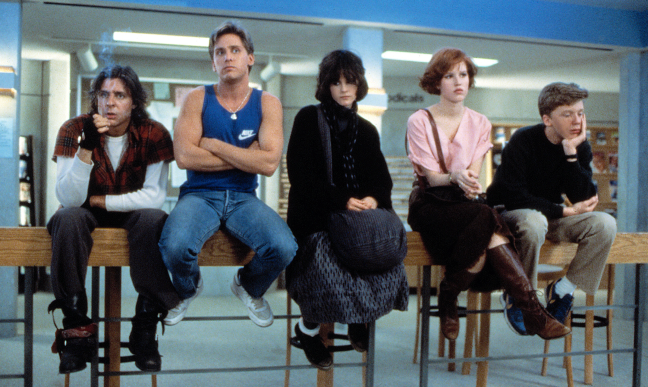Everything old might be new again, even in the Brat Pack world (hello, “St. Elmo’s Fire” sequel), but ’80s teen queen Molly Ringwald has offered a measured — yes, it’s possible — take on where she thinks films based on some of the most popular films of the decade should go. In short: traditional remake? No. A new story inspired by? Sure!
In a recent wide-ranging chat in honor of the film‘s 40th anniversary, hosted by “Happy Sad Confused” podcaster Josh Horowitz (which is available to view in full online, via Entertainment Weekly) was joined by “The Breakfast Club” stars Ringwald, Emilio Estevez, Anthony Michael Hall, Judd Nelson, and Ally Sheedy.
During the much-anticipated reunion of Ringwald and the other four stars of the 1985 John Hughes-directed high school classic “The Breakfast Club” on Friday at Chicago Comic & Entertainment Expo, the question of remaking the film inevitably cropped up. In response, Ringwald offered this: “I personally don’t believe in remaking that movie, because I think this movie is very much of its time.”
Wait, wait, hold on. While other outlets have latched on to Ringwald’s “no remake” statement, she went on to further clarify her meaning.
She continued, “It resonates with people today. I believe in making movies that are inspired by other movies but build on it and represent what’s going on today. This is very, you know, it’s very white, this movie. You don’t see a lot of different ethnicities. We don’t talk about gender … none of that. And I feel like that really doesn’t represent our world today. So I would like to see movies that are inspired by ‘The Breakfast Club’ but take it in a different direction.”
She’s not wrong, on some accounts. While the film, which follows five very different high schoolers (recite it with me now: a nerd, a jock, a princess, a basket case, and a criminal) as they spend a seminal Saturday afternoon in detention, is quite white, it’s also a film that’s fundamentally about relating to other people who you might not instantly feel kinship with. That’s a story that still resonates, as Ringwald notes, and one that could prove ripe for a remake, albeit with some creative and clever casting.
While the film is also not explicitly about gender, anyone who saw it at an impressionable age (read: me), likely took the conversation about the perception of girls vs. boys when it comes to sex and hook-up culture very much to heart (in the immortal words of Sheedy’s Allison: “Well, if you say you haven’t, you’re a prude. If you say you have you’re a slut. It’s a trap. You want to, but you can’t, and when you do, you wish you didn’t, right?”).
It’s not the first time Ringwald has grappled with a mature reading of some of her earliest works, especially those she made with Hughes. In 2018, Ringwald wrote an essay for The New Yorker that similarly explored what it’s like to look back on some of the more dated aspects of the film as an adult.
“I thought about it again this past fall, after a number of women came forward with sexual-assault accusations against the producer Harvey Weinstein, and the #MeToo movement gathered steam,” Ringwald wrote of some of her character Claire’s scenes with supposed paramour John Bender (Nelson). “If attitudes toward female subjugation are systemic, and I believe that they are, it stands to reason that the art we consume and sanction plays some part in reinforcing those same attitudes.”
Still, Ringwald concluded her essay by writing that she hopes Hughes’ films will endure and that “it’s up to the following generations to figure out” how to analyze them. Or how to remake them?



